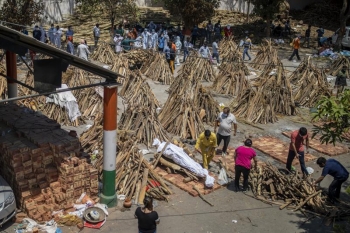
 Pachu Menon
Pachu Menon

As if the consternation of the pandemic is not enough, the country has now to deal with the horrors of hospital mishaps claiming the lives of coronavirus patients admitted there.
Less than 48 hours after a shocking oxygen leakage-triggered mishap claimed the lives of 24 patients at a Nashik civic hospital, as many as 14 COVID-19 patients died when a fire swept through the Intensive Care Unit of a pandemic hospital at Virar in Maharashtra’s Palghar district.
While conflicting reports as to the cause of the fire have emerged, the fact remains that a ‘maintenance shortcoming’ was responsible for the unfortunate incident.
Even in the mishap which occurred at the hospital run by the Nashik Municipal Corporation, oxygen supply was disrupted due to a leakage in the main oxygen storage tank.
Timely maintenance of all medical equipment is a vital aspect of hospital management. Any negligence could lead to fatal consequences.
Moreover, such accidents which happen in designated COVID-19 facilities draw all the more attention for the nature of patients who are lodged there. Fighting against the ravages of the disease, they are all in a very vulnerable position. Any lapse from the hospital managements’ side will hence prove costly resulting in the loss of lives.
The state administration will hence have to take a stringent view of these mishaps and bring the guilty to book.
As the pandemic continues to rage on, COVID care centers across the country are in the grips of a severe shortage. In addition to the oxygen crisis, hospitals across the country are battling acute shortage of beds, medical staff and life-saving drugs as well!
If Kerala can, why not the rest of India! This is the question that weighs heavily on everyone’s mind as a gasping capital welcomed Oxygen from Bangkok and Paris to save the lives of Delhi citizens.
As the mad scramble for oxygen in most parts of the country continues unabated, it is pertinent to have the nation envisaging ways to enhance its share of the life-saving gas. Without delving into the probable causes that went into the oxygen crisis in India, solutions are the need of the hour.
The move to rope in private hospitals to accommodate coronavirus patients too is yet to yield the desired results.
Moreover, reports of ‘waiting lists’ in crematoriums in the national Capital should also turn one’s attention towards the miserable condition prevalent where the COVID victims are being denied dignity even in their death.
Besides putting the country on international travel red list as COVID-19 cases here burgeon, the deadly coronavirus has further snapped India’s link with a large part of the world.
Yet there is no perceptible change in the behaviour of the people as they continue to move around flouting the safety guidelines prescribed.
Nor has the government shown the verve to strictly enforce the restrictions imposed. Although undesired, as apprehended, are we rushing headlong into an inevitable lockdown once again!
Although researchers believe that there could be a number of factors at work in the COVID surge, one can’t but have a feeling that it has been elections that has spelt doom for the country vis-à-vis the worsening COVID predicament for India.
For the Madras High Court to have severely reprimanded the Election Commission of India over the COVID-19 second wave in the country and holding it ‘singularly’ responsible for the spread, it would have taken some damning evidence which very strongly suggested that the EC did not take cognizance of the deteriorating situation brought about by the pandemic.
Lacking any kind of exercise of authority, the ECI has been criticized for being the most irresponsible institution over the last few months in not stopping political parties from wanton abuse of the COVID-19 protocol.
Of course these observations were made by the Bench while hearing a plea moved by Tamil Nadu Transport Minister seeking direction to the ECI to follow a slew of measures aimed at ensuring fairness in the counting of votes on May 2 in one of the constituencies where there are 70 aspirants contesting the seat.
But the story of indifference during this last one month of elections in four states and a Union Territory which went to polls couldn’t have been more contemptible.
Allowing huge political rallies during a pandemic in which social distancing norms and masking were thrown to the winds, the Election Commission without a doubt is grossly guilty of disregarding the orders of the court in this matter.
If Constitutional authorities are to be reminded time and again that public health is of paramount importance, one can well gauge the emphasis given to this aspect of safety during the pandemic.
As so rightly said, it is only when a citizen survives that he will be able to enjoy the rights that a democratic republic guarantees.
Hence the warning that the High Court will stop counting of votes unless a blueprint for Covid-safe behaviour is in place should serve to remind the ECI that it cannot behave arbitrarily on such matters!
However, while understanding that elections are another way of exerting constituent power, it is somehow difficult to comprehend the manner in which the government has gone about declaring and conducting elections in the recent past with complete disdain for the safety diktats prescribed as regards the Covid-pandemic.
The municipal elections held in Goa pretty much conform to these irregularities.
It is at such times that the mind mulls over various options to tide over the hopeless situation that we appear to be in now.
Is there a better way to manage the entire electoral process in the country! Could the nomination procedures, election campaigns and the polling be carried out in such a way so as to attract the least of crowds!
Ever since the COVID-19 outbreak, governments across the globe have been discouraging large gatherings and encouraging the ‘Work From Home’ concept to overcome the scourge of the virus.
With ‘virtual’ platforms being conceived for carrying out virtually everything under the sun, business or otherwise, would it be wrong to conceptualize similar methods to accomplish the not-too-cumbersome task of electing our representatives!
With healthcare, education, business and other aspects of everyday life acclimatizing to the ‘online’ craze during the pandemic in the country, isn’t it time the nation also thought about conducting elections online!